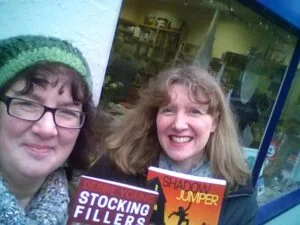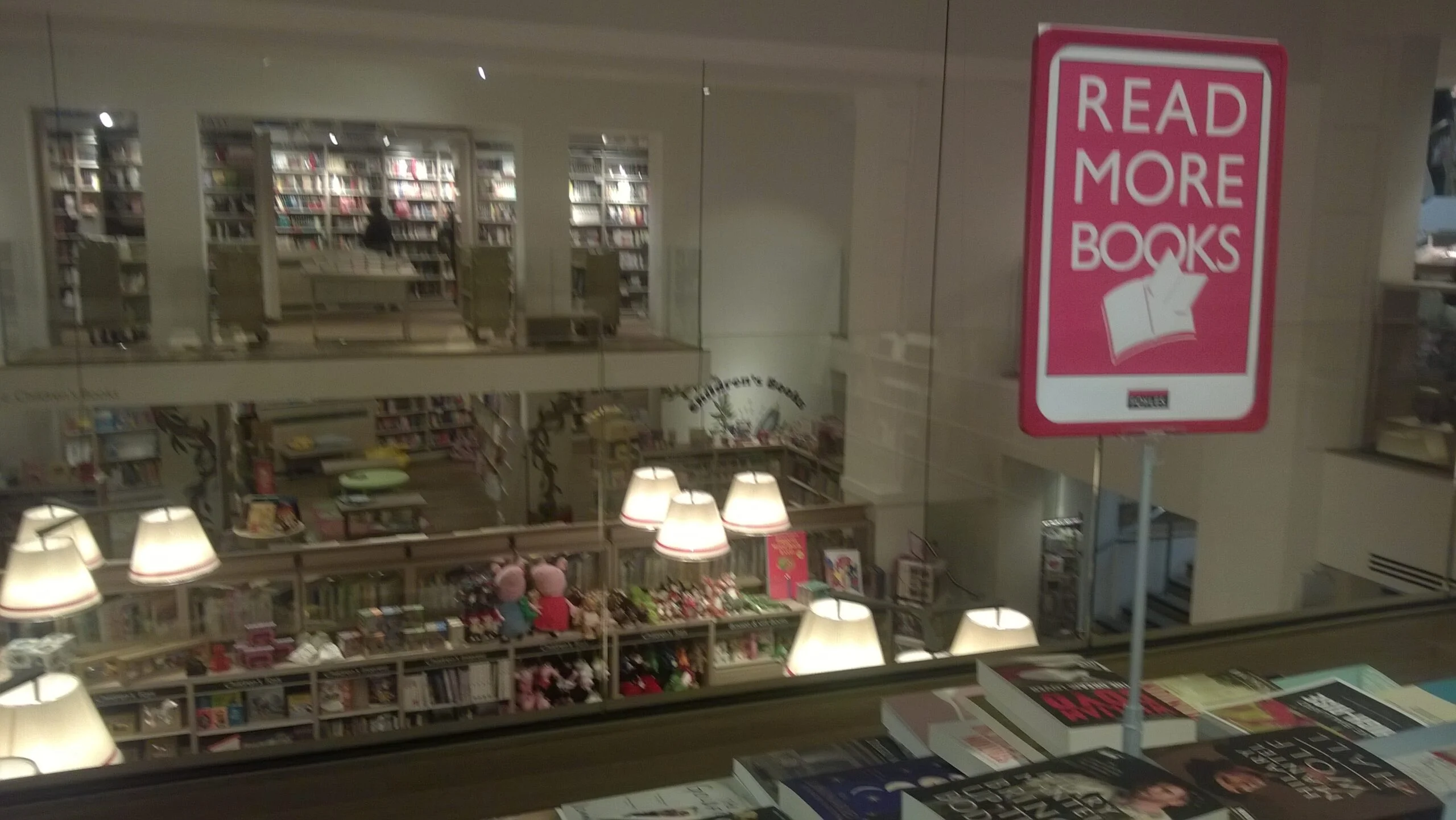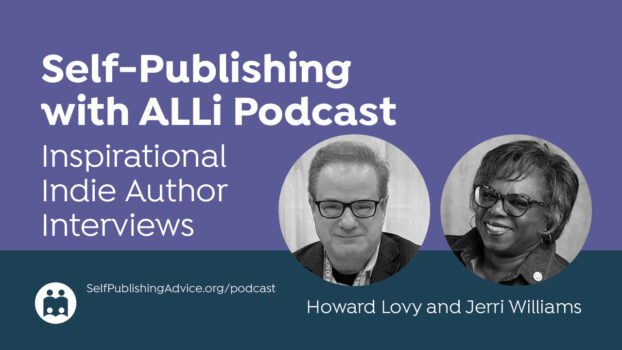
In a very unseasonal picture, Julia Forster and I celebrate having just sweet-talked a local bookshop into stocking our books for Christmas!
It's all too easy for indie authors to assume that independent bookstores and bookshops aren't interested in self-published books, that it's not worth building up a relationship with them, or that it's simply too difficult. Not true! To mark Independent Booksellers' Week, here are 21 ways to support your local independent bookshop – and most of them won't cost you a penny. The more of these you do, the better friends you will become with your local bricks-and-mortar store, and the more likely they will be to stock your books.
- Buy books! If you plan to buy a book, and have a bricks-and-mortar store near you, buy it there. If the book you want is not in stock, they can usually get it for you just as fast as any online ordering service. It may not be cheaper, but you’ll be able to buy it with a clear conscience!
- Give books as gifts (so easy to wrap and post at Christmas and birthdays).
- Buy National Book Tokens (that's a UK product, but I'm sure there must be equivalents in other countries) – only able to spent in “proper” bookshops and a great way to encourage children and young people to acquire the benefits of a reading habit. Yes, they might rather have an iTunes token, but National Book Tokens have gone zonking up in the cool stakes with trendy plastic credit-card style design. Didn’t you love to receive book tokens when you were a kid? Pay that joy forward to the next generation, and you’ll be helping a bookshop at the same time.
- If your books are stocked in a particular shop, add it to the list of stockists on your author website. To ensure they continue to be stocked, you need to drive a pull -through of demand: getting the books stocked is just the first part of the process. Don’t just list the usual Amazon affiliate links or whatever, which earn you peanuts in any case, and are more effective in fuelling Amazon’s empire than your bank account. (It will also score you a point with any local bookshop looking you up on Amazon – much better than if when they visit your website, they find you’re driving all your readers away from the high street to online retailers, like some evil Pied Piper of the book trade.)
- Remind people to support their local bookstore, shop local, or however you prefer to word it. If their local bookstore is not the same as yours, suggest they ask the proprietor to order your book for them. If enough people start clamouring for your book in any particular shop, it’s likely the proprietor will start keeping it in stock for as long as the demand continues. (Just make sure it is available through the standard bookshop distribution system by publishing your print books on Ingram Spark, as well as CreateSpace – you’ll find plenty of info on that score on the ALLi blog here.)
- Resolve to visit your nearest bookshop whenever you are on the high street or at the mall. Become a regular face there, befriend the staff, and before you know it, you’ll find an opportunity to tell them about your book, even if you didn’t have any intention of selling it there. Don’t be shy of telling them about your book (or worse still, go in with a sense of entitlement). Most booksellers will consider authors premium-value customers, whether or not they stock your book, because you’ll be perceived to move in circles where reading is king and to have your own tribe of avid readers, to whom you’re likely to recommend other books as well as your own.
- Support other authors’ events there. Whether or not you’re interested in the author or their book, it’s another way to become a familiar face and known supporter of the store. You’ll also pick up tips on how to run an author event (or not!) and might even gain a new author friend to add to your own network.
- Keep track of the kind of events they hold there, which they’ll have carefully chosen to suit their clientele. See if you can dream up one of your own in a similar mould, either on your own or with indie author friends. Then go all-out to bring an audience with you, who buy books at the event, whether yours or others. Stage a successful event, and you may even get asked back for more – because each time they see you in future, they’ll have pound/dollar/Euro signs in their eyes, seeing you as an asset to their business.
- If you’re staging local events elsewhere, show your support for the bookshop by inviting them – not to run a shop for you, but as a guest. Whether or not they wish to come, ask for a stack of their promotional flyers or bookmarks to give to your audience to promote their bookshop.
- If your local bookshop runs a festival, as many do, offer your services as a volunteer. Most festivals, small or large, rely on an army of volunteers to be financially viable. Volunteers tend to be either avid readers or aspiring authors, as I discovered when I was buttonholed by a small crowd of volunteers after the audience had left a talk for authors that I gave at Cambridge Lit Fest last year. It's a great opportunity not only to score points with your bookshop, but to network with potential readers and make new like-minded friends. Do it enough, and the bookshop will start to see you as one of their ambassadors, which will make them more likely to be ambassadors for your book too.
- If there are national or international bookish events going on that your local store is likely to engage in, you should also embrace them. If you a children’s or YA author, World Book Day provides a great opportunity to support our local bookshop by going in to be a resident author for the day, helping run activities for visiting children. If you’re a World Book Night book giver, you can designate your local bookshop as your pick-up point – an easy way to declare yourself as a passionate advocate of books and reading, rather than an egotistical author thinking only of his own book’s sales.
- If they hold a book group, or book groups meet in their shop, either offer to be a guest speaker to the book group, or join it as a reader – again, a great networking opportunity that will lead to other advantages.
- There are lots of online things you can do to support the bookshop without even leaving your desk, e.g. like their Facebook page, comment on their posts, share their posts; follow them on Twitter, RT key posts, #FF them for Follow Fridays. (Being a bookseller can feel like a thankless task sometimes, and strategic social media sharing can make their day – and probably earn some shares of your posts by return.)
- Subscribe to their online newsletter. You know how good it feels when someone subscribes to yours.
- If you blog, and host guests, consider doing an interview with your local bookshop proprietor or staff. If you’re a book blogger, consider also giving a shout-out to high street bookshops that you love, adding to them as you find more on your travels and on holiday.
- If they have an instore loyalty card, sign up for one. Who could resist having a store card branded Foyalty? (offered by Foyles bookshops in the UK). Especially one that earns you points and free coffees when you spend over a certain amount.
- Ask if you could take a photo of the store to go on your website. There’s bound to be somewhere you can use it as an illustration, even if they don’t stock your book. Then, when you use it, send them a link, which they may even share, which might drive them to consider stocking your book in future.
- Ask whether they could spare a supply of their branded bookmarks to be included in every copy of your book that you handsell. You’re effectively offering them free advertising space before a bookbuyer.
- Use their facilities – by which I don’t mean the loo! But if they have a coffee shop, and you plan to meet friends for coffee, or you want to eat out while you’re shopping, use their coffee shop. I’ve never met a bookish coffee shop I didn’t like…I even refer to the Bristol Foyles’ coffee shop as my Bristol office, and I’m only half-joking. It’s my city-centre place of choice for meetings with other authors, whether on a friendly basis or as one of my book promotion consultancy slots, and the chances of us both leaving the shop without buying a book as well as a coffee are pretty slim. In fact, I consider buying a book notional rent for my Bristol office – and if I really can’t think of a book I want, I can always buy a greetings card or a notebook. (Mmmm, notebooks!)
- Show simple kindness and good manners: when buying a book, smile, chat (unless they’re hugely busy), say something nice, and thank them for their help. My local bookstore proprietor, Hereward Corbett of the Yellow-Lighted mini-chain, makes no secret of the fact that he always welcomes gifts of coffee from the nearby bakers – latte, please, if you’re passing…
- Treat staff like the professionals that you both are. If you’re seeking a book for a particular purpose, ask for and respect their advice, which never fails to amaze me, unlike the “advice” that results from keyword searches on online retail sites (a recent Amazon search for books on Mothers’ Day yielded an array of tales of child abuse and other woes).
OVER TO YOU
Can you think of any other ways to support your local bookshop? We'd love to know!
21 ways to support your local bookseller by @DebbieYoungBN #Authors4Bookstores @IndieBound_UK Share on X




I love how owners of independent bookshops know about books and will recommend good ones to readers. I was invited to a ‘readers’ event in a bookshop last December and I was so excited when I was in and she had cupcakes with little book covers on each one and as I was the least well-known author there, I was delighted to have my book cupcakes beside Martine Madden’s, Liz Nugent’s and Donal Ryan’s!
I’m having my book launch in a local bookshop in September and I’m really looking forward to it.
Hi Orna
It’s a question really:
When you are talking about ‘independent’ bookstores, I am concerned that the term might not mean the same thing in Canada as it does in the UK. I was hoping that the expression ‘Independent bookstore’ or ‘bookseller’ meant that the place carried for sale, (not necessarily exclusively, of course) books by independent authors or author-publishers.
Could you clear this up for me.
Your article was excellent and very helpful, by the way.
Many thanks
Jim
Hi Jim
Glad you enjoyed the article and found it helpful.
Gosh, it’s always tricky to pick terminology that works the same all around the world – I had an English bookseller take me to task for referring to bookstores rather than bookshops recently. (As a Brit, my instinct is to call them shops – now trying to alternate for the sake of international relations!)
When I say independent bookstores/shops/sellers, what I mean is those that are owned by an individual rather than a corporation – usually one-off shops or very small chains. Although the same principles can be applied to single branches of big chains of shops, really.
You might like to know I’m currently reading a great book by a really good Canadian author-publisher, by the way! 🙂
Best wishes
Debbie